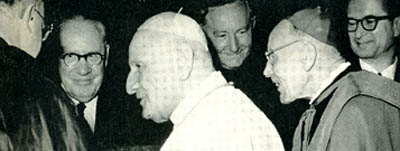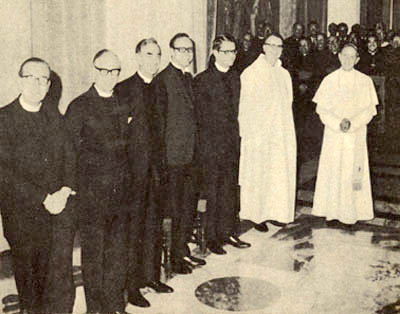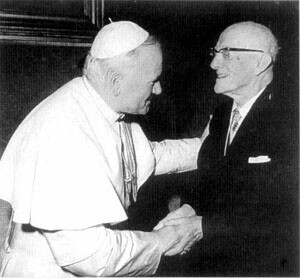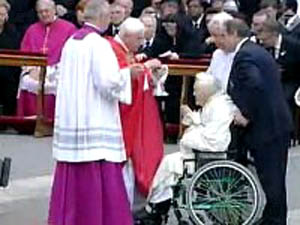 |
THE BEST OF... Fr. Stephen Somerville
Resisting the Novelties of the Conciliar Church
Fr. Stephen Somerville
A traditional Catholic is accused of disobedience to the Pope or to his Bishop because he refuses to attend the Novus Ordo or conciliar Mass. How can he justify and defend himself?

St. Pius V established the Tridentine Mass for all time
|
There are other manifold and alarming changes in the Catholic Church in recent decades. But it is right to focus principally on the changes in the Mass, because the Mass is the flagship of the Catholic Church. The Mass is also our greatest and holiest possession. Moreover, we are duty-bound to attend it every Sunday. Furthermore, it is during the Sacrifice of the Mass that there takes place the transformation of the bread and wine into true Flesh and Blood of Our Lord Jesus Christ, which is offered to us in the Sacrament of the Holy Eucharist, the greatest of the Seven Sacraments and is served by these other Sacraments in ways that reveal them to be likewise essential to our salvation, that is, to gaining Heaven.
Now, the traditional Catholic may have studied the changes made by the post-Vatican II establishment in the other Sacraments, and may object seriously to their new mode of performing. He might also refuse to send his children to the local conciliar Catholic school with its watered down religion teaching (without the Catechism), with its notorious permissive “sex education,” and various bad examples.
These are some of the worst changes in the Conciliar Church. Our traditional reader may sincerely recognize in them dangers to the Catholic Faith and to one’s holiness (the life of Sanctifying Grace). His children would likely be in still greater danger of spiritual harm. They all run the risk of eventually dying not in the state of grace. This means in the state of mortal sin. It means eternal loss in Hell.
Reasons for resistance and disobedience
Under the circumstances, may the traditional Catholic resist or disobey the Pope or Bishop who orders him to conform to the progressivist Conciliar Church?
The answer is definitely, yes, he may and should resist or disobey the new teachings or customs insofar as they are clearly contrary to the previous Magisterium and worship of the Church. St. Robert Bellarmine teaches us that
“just as it is licit to resist a Pontiff who attacks the body, it is also licit to resist a Pope who attacks the soul or …. above all, who attempts to destroy the Church. I say,” St. Robert continues, “that it is licit to resist him by not doing what he orders, and by preventing his will from being executed” (1).
Therefore, our correspondent may decline to attend or use the liturgy and schools of the Novus Ordo Church.

John XXII receiving the Protestant observers to Vatican II
Informations Catholiques Internationales, October 15, 1972
|
Why may he disobey? Because the new progressivist Hierarchy is dismantling the structure of Catholic Church as it was known for 20 centuries of history. This destruction has many facets, but here I focus on two points.
First, there is the infidelity of the Conciliar Church to her Catholic past. Think of the multiplied irreverences to Christ-God at Mass. For example, the Tabernacle set aside in a corner with few genuflecting to it; the Gregorian chant and other reverent chants to honor the Holy Eucharist no longer heard, but replaced by Protestant hymns and sacro-pop novelty songs; the Communion rail removed and little if any sign remaining of adoration at Communion time; 70 per cent of adults (says a survey) no longer believing in the Real Presence of Christ’s Body (corollary – no victim, therefore no sacrifice); the state of grace scarcely surviving and few, precious few, going to Confession; Protestant leaders applauding the New Mass for its Protestant conformity. I could go on. But these are some of the infidelities in the conciliar liturgical scene.
Do the authors of this sacral devastation, be they Bishops or even Popes, deserve our obedience? Hardly! In fact, most of them demand it as seldom as possible, because of the generalized breakdown of authority in the Conciliar Church. Open and uncorrected disobedience corrodes the authority still further.
Secondly, after those infidelities, I come now to the new doctrines which were never taught before in the Catholic Church. Most prominent, it seems to me, are universal salvation (all are saved, none need be condemned) and religious liberty. According to it, the Conciliar Church abdicated from the Catholic doctrine that the civil authority should protect the true religion. From Vatican II onward, all men are free to follow or negate the true religion and to profess, without any legal sanction, whatever belief he wants.
Those two, major themes of Second Vatican Council and its aftermath are strangers to Catholic doctrine. They are not affirmed in black and white terms. They are presented rather implicitly and confusedly. For example, Hell is not mentioned in the new Rite of Penance, along with the old notion of “imperfect contrition.” The “hard” themes have been eliminated from the Collect Prayers. The prediction of the Great Apostasy (2 Thes. 2) is omitted from the new Lectionary (Old Lectionary: Sat in Ember Week of Advent) Persons are beatified who did not practice heroic virtue.
Should one obey or submit to this ecclesiastical structure of universal salvation and freedom? On the contrary one should resist and question it for the risk it poses to that very salvation and freedom.

Paul VI posing with the Protestant theologians who helped compose the New Mass |
All the changes were done to the Church, it is alleged, for “ecumenical” reasons, that is, to make Catholics to be “Protestant friendly,” less different even from Jews (less “anti-Semitic”), and less irritating to the secular, non-religious establishment. But these changes are actually destroying the Church. We are witnessing the auto-destruction of the Church (Pope Paul VI actually said this publicly). And this destruction is surely masterminded by Satan himself, whose smoke is in the sanctuary (these words were likewise uttered by Paul VI).
It is widely alleged that since the 1930s, clever young Marxists, Freemasons and Jews were infiltrated into the Catholic Church, posing as pious seminarians and aiming for ordination and various promotions so as to corrupt and destroy the Church from within. This infiltration is documented, but is curiously hushed up by the Catholic body politic. The book Memoirs of an Anti-Apostle is a remarkable testimonial to it.
Do the Pope and the Bishops, who are promoting these facts, have right to claim our obedience, genuine authority over us? It would seem not, or less and less as the situation worsens. The traditionalists may and should calmly disobey them, so as to obey God. The great Dominican theologian Francisco Vitoria teaches us:
“A Pope must be resisted who publicly destroys the Church. What should be done when the Pope because of his bad customs destroys the Church? .... He should neither be permitted to act in such fashion nor should he be obeyed in what is evil. Consequently, if wanted to destroy the Church or the like, he should not be permitted to act in that fashion, but one should be obliged to resist him. The reason is: he does not have the power to destroy” (2).

John Paul II greeting Protestant theologian Oscar Culmann
|
It is also Catholic truth that we should maintain the holy tradition of worship and doctrine from older times and the Popes of the past. To obey the new ways is to disobey the good old ways of Pope Pius XII, of St. Pius X (the only sainted Pope of the 20th century), of Blessed Pius IX , and of St. Pius V, who promulgated the Tridentine Mass in 1570. But the discipline and truth of those great Popes came to us through them from Our Lord Himself. St. Peter tells us plainly: It is better to obey God than men (Acts 5:29). Yes, indeed, the traditional Catholic may resist and disobey the recent Popes and Bishops when they order us away from serious Catholic Tradition.
Finally, let Canon Law of 1917 itself support our right to disobey the Progressivist Revolution. This great Code of Law says that the First Law to which all the others should be directed to is the salvation of souls. Well, the pro-Protestant liturgy, prayers and teachings of the Conciliar Church are leading or tending to lead souls to Hell. We must resist and disobey these evil standards so as the better to save our souls.
The specter of “disobeying the Pope” may actually be exaggerated or even falsely presented. Pope Paul changed the words of his edict Missale Romanum commanding use of the Novus Ordo Mass. He used devious and vague language. And why did he do so? Because he knew the powerful argument that the Tridentine Mass was to be perpetual by the deliberate and firmest will of Pope St. Pius V. He knew that to violate the Tridentine Mass was to risk the anger of Saints Peter and Paul. Yet he deliberately proceeded to wrench the Catholic Church out of its holy tradition. It is said that he died not in the odour of sanctity, but in a hideous stench of foulness so great that no one could approach his catafalque.
Since then Pope John Paul II worked to make the Old Mass available, particularly by the priests of the Fraternity of St. Peter, as well as priests locally approved for this by their Bishop. This was intended to undercut the good work of Archbishop Lefebvre and his faithful followers. Sad to say, the Bishops have not made the Tridentine Mass easily and generously available. They have hedged it round with restrictions and evident contempt. And why do they act so? Surely because they fear that this holy flagship of the Catholic Faith will discredit and cast into a bad light the new Conciliar Church, the new Mass, the new Catechism, the new substitutes prompted by the Father of Lies for the shattered remains of the Bride of Christ.
Progressivist indignant reactions
At this point, I can hear some rising voices of conciliar indignation, of angry confrontation from zealous and deluded servants of New Church.
Who wants to return to that antique stuff?
One objection is this: “What downright nonsense you are speaking! Who wants to return to that stuffy, Latin, Constantinian, medieval Tridentine Church? Thank God for the wonderful reforms! Thank God for the Mass in English, for the enthusiastic participation of so many women, men and children in the Sunday celebration. Thank God for the freedom and creativity and inculturation!”
Yes, I have in the past been flagellated with words like these at church meetings. I know persons who could answer them soundly and roundly, with most telling testimony, with awesome words of faith and conviction and experience. These answers have been published in good books and websites. Let us continue our fight, our self-instruction, our Catholic education, in peace and charity, in light and with fidelity.
The “good” done by Novus Ordo parishes
I await one more objector. He is the one who tells me in serious calm: “Yes, but there are many choices in many parishes. I choose to go to a good parish that I know, where the priests are zealous and prayerful, where the liturgy is reverent and nourishing, where the lay groups are hard working and dedicated, where the recent Vatican instructions are taken seriously, were the choirs add beauty to the celebrations. This surely is the Catholic Church as it should be.”
Perhaps you have been to a church like that or heard of parishioners like the one above who testify to the balance, richness and spiritual profit of his Sunday church-going.
I am tempted to reply, “Thank God that there are some good things to report in the Conciliar Church out there.”
But I recall my own latter years in the Novus Ordo system. We did some creditable things: I always used the Roman Canon, or First Eucharistic Prayer, with its doctrinal strength. I corrected for long years the false translation of pro multis – “for all” – to the correct “for many” over the chalice. We used male altar servers. We injected a little Latin and Gregorian Chant into every Mass. We maintained reverence where we could. I tried (and yes, I failed) to persuade the people to come to Confession. Were Catholics glad to come to my Church? Yes, I know that many were. But in the end, the proponents of the New Church won the day, and I found myself in a situation ideal for re-discovering Catholic tradition. Deo gratias.
In the meantime, yes, some Novus Ordo parishes are not so bad. But let us remember that this revolution and apostasy in the Catholic Church was predicted by Jesus and by St. Paul and various non-biblical prophets: “Rome will lose the Faith”. The survival of some truth and holiness here and there may slow down the apostasy marginally. But the same survival of partial truth also helps the enemy to disguise the overall errors of the post-conciliar Church, to foster conformity, to let Satan appear as an angel of light.
Who is favorable to Protestantism?
Our reader reports that his criticisms of the Pope are held to be a slippery slope into Protestantism, that to trust in one’s own faith in Scripture and doctrine is to lapse into the Protestant error of private judgment.

Benedict XVI giving Communion to Protestant Brother Roger Schutz, on May 11, 2005
|
This accusation is shallow and misleading. It is really the conciliar leaders who are Protestantizing the Catholic Church. All the liturgical changes are made along Protestant-friendly lines. Pope Paul VI invited six Protestant experts to “observe” the reform of the Mass so that Protestant feeling would not be offended by it. As for the past, Pope Pius V deliberately made the Roman Missal firmly Catholic and tamper-proof so that Protestant influence would be zero in future. Traditional Catholics intend to reclaim this genuine Catholic ground.
If one considers other non-liturgical concessions to the Protestants made by the Progressivist Church, he sees the diminishment of the prerogatives of the Pope as the Monarch of the Church and Teacher of Truth. He sees the increasing role of the Episcopal Conferences which reduce the central government of Rome to majority opinion; the introduction of women into the Sanctuary; the doctrine of justification – by Faith alone, sola Fides – accepted by Catholic and Protestant leaders recently in Augsburg, and so on. All these changes were made to please Protestants and to make the Progressivist Church more similar to them. To resist such conciliar leadership is to protect us from Protestantism.
Is everything that comes from the Pope coming from God?
Our reader quotes his critics: “we are to believe all things that come from the Pope are from God” and should submit to them even if it is contrary to the past teachings.
This is very misleading. All good and neutral things are from God, but sins and errors are from man. The current Vatican is prone to mistaken, sinful and harmful decisions, teachings and policies. After serious study and prayer we traditional Catholics can and should intervene respectfully and lucidly and strive to “admonish the sinner and instruct the ignorant,” two traditional works of mercy.
Should a non-theologian never question the Pope? Well, remember the Christological debates of the early Church such as during the Arian heresy of the fourth century. The people often took a vigorous interest in those theological arguments. Sometimes it was the Bishops, Emperors, Generals and wealthy classes who powerfully promoted the heresy in the face of the simple clear faith of the common folk.
Today we need to engage more minds in the public debate of fidelity to Tradition versus the acceptance of Vatican II novelties. We don’t need to become expert theologians, but we can discuss the themes based on that common sense of the faithful that the Holy Ghost never denied to His Church. It was this sensus fidelium that preserved the Catholic Faith against the Arian heresy that had contaminated almost all Prelates and even a Pope – Pope Liberius. I am sure that with the support of the common sense of the faithful based on the perennial doctrine and liturgy of the Church the good cause will win, with the grace of God. Do the critics assert that “God will handle all things when and as He pleases”? Indeed he will, but He pleases to involve you and me in the work. Let us not fail Him.
1. Robert Bellarmine, De Romano Pontifice. Lib. II, chap. 29, in Opera Omnia, Paris: Pedone Lauriel, 1871, vol. 1, p. 418.
2. Obras de Francisco Vitoria, Madrid: BAC, 1960, pp. 486-487.

Related Topics of Interest
 Declaration of Resistance to the Vatican Ostpolitik Declaration of Resistance to the Vatican Ostpolitik
 Be Thou Peter! Be Thou Peter!
 John Paul II kisses the hand of Rowan Williams, head of the Anglican sect John Paul II kisses the hand of Rowan Williams, head of the Anglican sect
 John Paul II preaching at the Anglican cathedral of Canterbury John Paul II preaching at the Anglican cathedral of Canterbury
 Cardinal Mahony at an interfaith baptismal ceremony in an Episcopal temple Cardinal Mahony at an interfaith baptismal ceremony in an Episcopal temple
 The New Mass - A Flavor of Protestantism The New Mass - A Flavor of Protestantism

|
Best of | Home | Books | CDs | Search | Contact Us | Donate

© 2002- Tradition in Action, Inc. All Rights Reserved
|
 |

|